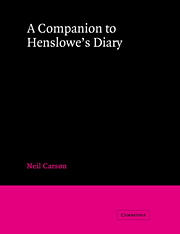Summary
READERS whose interest in the Elizabethan drama is focused primarily on plays usually find Henslowe's diary a disappointment. The pedestrian prose, erratict spelling, chaotic organization, and (especially) the confusing figures seem as remote as it is possible to be from the passion and poetry of the Elizabethan drama. What, such readers wonder, do these endless lists and dry accounts have to do with the work of Shakespeare or Marlowe? While understandable, such an attitude ignores (or under-emphasizes) the fact that Elizabethan plays (like those of other ages) are rooted in the theatrical conditions of their time, and have developed as they have, at least in part, in response to those conditions. To understand Shakespeare and his contemporaries fully, therefore, we must try to imagine their works in their original theatrical context. As a guide to that context, Henslowe's diary is indispensable.
Henslowe did not prepare his diary for theatre historians, however, and to understand his records it is necessary to recast them. Information that Henslowe recorded chronologically needs to be reconciled with the actors’ playing seasons; expenses have to be set off against income; details relating to individual plays must be collated, and a distinction made between expenditures of different kinds. This abstracting and summarizing of information in the accounts has been done in the series of tables appended to this volume, where interested readers are urged to check out the claims made in the discursive commentary.
- Type
- Chapter
- Information
- A Companion to Henslowe's Diary , pp. 67 - 79Publisher: Cambridge University PressPrint publication year: 1988

